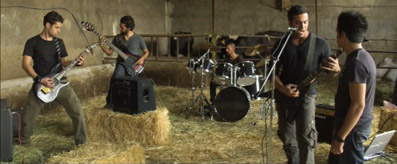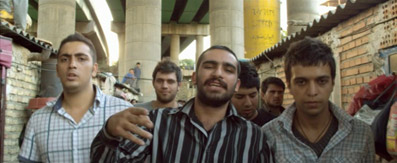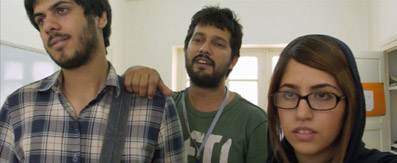| |
"You're insane! Do you know what you can do with this? Knock the doors down! Shout! This is what music is supposed to be! What's with you, giving up on this kind of talent?" |
| |
Nader to Ash and Negar after hearing their music for the first time |
If you went to college or university then there's a good chance you were either in a band or knew someone who was. When you're young, music is a lot more than something to accompany a jog or tap the steering wheel to when you're driving, it's one of the things that define your generation and distance you from those older authority figures you should by rights be rebelling against. For many, it's not enough just to listen to the music, they want to create it, to be the one on stage thrashing the guitar just out of reach of the hoard of outstretched arms below. To become a rock star is – or at least was for my generation – the ultimate teenage fantasy, to achieve fame without sacrificing creativity or suppressing your instinct to kick against the system. After all, in what other profession could you find your face on magazine covers and still get to smash up hotel rooms and consume copious amounts of drugs and alcohol without being frowned on by those who are buying your wares?

For most, this remains a pipe dream, an alternative reality that was never destined to be. They never got round to really learning an instrument and never hung out with the right kind of people. Years later, they can live out their fantasy playing Guitar Hero on their PS3 and pretend, just for a few minutes, that the colourful plastic controller they wield with energetic abandon is a real guitar, and that the music escaping the stereo is of their own making. Those who did master their chosen instruments tended to form bands with like-minded friends, honing their skills on cover versions of the songs of others and searching for that unique sound that might just catapult them into the musical limelight. It's often down to a combination of talent and luck, the right sound at the right time being heard by the right producer. In my first couple of months at film school, I had a small part in a film whose lead role was played by a second-year student, one who the following year found sudden and unexpected success with a lively and perfectly timed pop hit that landed him and his band a gig on Top of the Pops.* Conversely, one of the occasional contributors to this site has fronted a number of bands, at least one of which was good enough to suggest a record deal was surely just around the corner. As far as I know, they disbanded before widespread recognition came a-knocking. Then again, for most aspiring bands it never does, at least on the scale they initially dreamed of. But there's nothing to stop them trying, and it's a path open to anyone prepared to pick up a guitar and start learning a few chords or navigate their way around the workings of a drum kit.
Now try to imagine what it's like to have such a passion and the need to express yourself through music in a country where doing so is forbidden by the state. Well obviously you don't do it. How could you? Rock bands tend to make quite a bit of noise, and if you're going to play to an audience or distribute a CD then it's not going to go unnoticed. Such is the situation in modern day Iran, where rock music of any kind has been banned outright since the 1979 Islamic revolution, and to this day – aside from from a few government-approved exceptions – you can't play it, you can't listen to it, you can't buy it or see it played live. And yet there are apparently over three hundred indie rock bands and two thousand pop groups currently active in the country, most of them part of a vibrant underground music scene that thrives and survives in spite of the attempts of the authorities to suppress it. This, my friends, is the essence of music as a force of rebellion and individual expression.

World cinema fans should at the very least be aware of the work of Iranian director Bahman Ghobadi, and if you've yet to see one of his films then do yourself a favour and add them to your wish list. He first came to international prominence with his 2000 debut feature A Time for Drunken Horses [Zamani barayé masti asbha], and subsequently directed Turtles Can Fly [Lakposhtha parvaz mikonand] (2004) and Half Moon [Niwemang] (2006), both of which come highly recommended from this quarter. Ghobadi's own passion for music and his despair at the barriers faced by Iranian musicians – a theme explored first in Half Moon – led to the enigmatically titled No One Knows About Persian Cats [Kasi az gorbehaye irani khabar nadareh] (I'm guessing that the the use of the word 'cats' here is a reference to the 60s jazz term), an exploration of Tehran's underground music scene through the eyes and experience of two Iranian indie rock musicians who have been invited to play at a concert in London.
This is, it should be noted, not a documentary per se, but a scripted drama based closely on real-life events. Ashkan Koshanejad and Negar Shaghaghi essentially play themselves (they even keep their real names), while the various musical acts they encounter are clearly the real deal. The only professional actor here is Hamed Behdad, who plays black market dealer Nader, a perpetually excitable ball of energetic enthusiasm whose unbroken jabber rarely pauses long enough for him to draw breath. On hearing their music he enthusiastically takes up Ash and Negar's cause, introducing them to an old passport forger named Mash David and working to secure the official permit they require for international travel. It's he that provides the film with most of its lighter moments, which reach a comical peak with his desperate and lightning-paced pleas to an unseen policeman following his arrest for film piracy and possession of alcohol.
Nader also introduces the pair to other musicians and bands from which they hope to recruit, in the process providing a whistle-stop tour of the Tehran underground music scene. In this respect the film is a natural companion piece to Fatih Akin's superb 2005 documentary Crossing the Bridge: The Sound of Istanbul and proves every bit as enlightening and musically thrilling. For a western viewer unaware of the Tehran rock scene (it was certainly new to me), the range and quality of acts on display here is an eye-opening joy, from the acoustic guitarist who plays for orphaned children to the Persian rap group and the heavy metal band that rehearses in a cowshed as farm animals watch indifferently on. Even Nader himself proves to be an accomplished singer, allowing actor Behdad and his Khorasani band Darkoob their own few magical minutes in the musical spotlight.

While it may seem that the plot functions purely as a link between the musical acts – every band gets to play at least one number, usually with accompanying pop-video visuals – there's almost a sense that a more complicated narrative would risk diluting the dense socio-political layering that accompanies every step of Ash and Negar's quest. Each character and location tells its own small story, and just about every component of the trio's first visit to Mash David – the international variance in David's forgery price list, the well-to-do couple seeking papers for international travel, Nader's black market DVD dealing – could be comfortably expanded into a short film of its own. Even the musical numbers are occasionally employed as a tool for social observation and sly critique, with images of the city and daily life intercut with those illustrating the appalling conditions in which the homeless forge out an existence. There's even an air of Le Resistance to the lengths the bands are forced to go to in order to conceal their activities from outsiders, an underground network of musicians who meet in secret and rehearse in soundproofed cellars and lofts, monitoring their neighbours in fear of discovery and driven by passion rather than a desire for financial gain. The real tragedy of their situation is caught in a couple of almost throwaway moments, as Ash and Negar express regret that the enforced secrecy of their activities means that their friends and families have never heard them play.
I'm not sure a narrative this structurally casual really needed its final twist, but it does provide a sobering punctuation to the film's message about how damaging these government-imposed restrictions actually can be. But there are still signs here of an underlying optimism for a more open and international future for the country's creative young things, something perfectly captured in the personality and drive of the musicians themselves, as talented, passionate and likeable a bunch as you could hope to meet, and who really do deserve the recognition and appreciation they seek. Ghobadi has fashioned a genuinely remarkable film here, one that's both illuminating and socially relevant, one that opens a welcome window to an aspect of Iranian life that few in the west will hitherto have even been aware of. And, like it's Turkish counterpart Crossing the Bridge, it lives through its music, whose captivating diversity has catapulted the soundtrack album at the top of my shopping list.
You need an official government permit to shoot a film in Iran, but Ghobadi was having none of it and instead choose to work covertly and guerrilla-style, something for which digital video is perfectly suited. The camera used here is the Silicon Imaging S12K, a lesser-known HD alternative to the Red or Viper cameras currently favoured by American feature film makers (it was also the main camera used on Danny Boyle's Slumdog Millionaire). At its best – usually outside in daylight – the image is sharp and detailed, displaying an excellent and well balanced contrast range. Elsewhere, Ghobadi's guerrilla approach produces varying results, with the crew forced to work with limited or available light on a very tight schedule (the entire film was shot in just seventeen days) with no opportunity for reshoots. Thus if cinematographer Turai Mansuri didn't quite get the shot they needed or the results weren't as crisp as they could have been (something you can't always confirm until you play the material back on a larger screen), then they had to live with it and use the footage anyway. There are thus some variances in colour and contrast depending on the location and lighting conditions and even a few shots where the focus is clearly out. Given the conditions under which the film was made (had they been caught filming by the authorities they would probably all have been arrested), I can easily live with this, and so should you, particularly given how damned good the rest of the film looks. The framing is 2.40:1 and the picture is anamorphically enhanced.

There's a soundtrack choice between Dolby 2.0 stereo or Dolby 5.1 surround, and this is a proper surround mix, not the re-coded stereo you'll find on some world cinema and indie film DVDs. And it's a good one, as befits a film in which music plays such a key role, having an excellent clarity and a strong dynamic range, with the music itself spread nicely around the sound stage. The soundtrack as a whole makes specific use of front and rear speakers, placing scene action behind our heads only when that's where it's supposed to be. The stereo track is noticeably louder than the 5.1, but displays a lot less finesse and is a little brash with some of the music.
Behind the Scenes of No One Knows About Persian Cats (53:43)
A substantial behind-the-scenes documentary, directed by Kavoos Aghaei, that follows the filming of several scenes and interviews key members of the crew, including director Ghobadi, co-screenwriter Hossein M. Abkenar, DoP Turai Mansuri, and sound recordist Nezamoddin Kiaie. Revealing for the technical and logistical aspects of the shoot, the filmmakers' sometimes makeshift approach (a motorbike POV shot is achieved by placing the cameraman in a wheelbarrow) and the extensive coverage of Ghobadi's directing style (a scene that you'd swear was improvised is shown to have been extensively rehearsed and micro-directed). It also suggests that this was a hugely enjoyable production to work on and that sound man Kiaie may well be the most affable man working in Iranian cinema – he openly sympathises with the hard-working cameraman who has to shoot everything without a tripod, and smilingly asks if he's been positioned in the street so the scene will benefit from light reflecting off his bald head.
Interview with Ash and Negar (7:19)
The two lead players, on whose story the film is directly based, talk in English about the genesis of project, the shoot itself, playing themselves, being a rock musician in Iran, their own music (their band, called Take It Easy Hospital, provides several of the tracks used in the film) and their future plans. Ash also reveals that he spent twenty-one days in prison for performing a concert, a not uncommon punishment, he assures us.
Theatrical Trailer (1:51)
A lively trailer that sells the film well to an international market.
Image Gallery (2:04)
A rolling slideshow of production and publicity stills, including one of an actual Persian cat.
A fascinating, revealing and musically exciting documentary, wedded to a docudrama recreation of actual events featuring the very two people on whose experiences it is based. A couple of minor visual wobbles should not detract from a film whose technical polish otherwise belies the speedy and covert manner in which it was shot, and the quality of the music and the density of the socio-political layering more than compensate for any narrative lightness. A fine DVD from Network, with a solid transfer, a well mixed 5.1 soundtrack and a couple of very worthwhile extras. Highly recommended.
* For those old enough to remember, the student was Nick Watkinson and his group was The Jags. Their chart single was Back of My Hand. You can watch it here: www.youtube.com/watch?v=hu91uv2f_Bs
There's an interesting article on the Iranian underground rock scene at: http://news.bbc.co.uk/1/hi/entertainment/8585902.stm
|